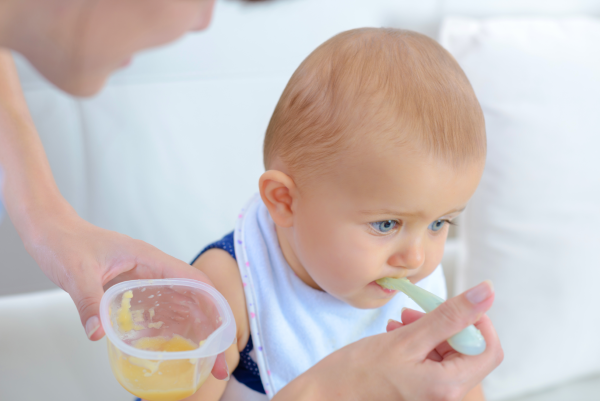The latest report from experts at the Royal College of Paediatrics and Child Health states that the amount of sugar in baby food must be restricted, and parents should be giving children more vegetables.
The organisation warns that even baby food which is marked "no added sugar" usually contains sugars from fruit juice or honey, and young children need to be prevented from developing a sweet tooth.
The study recommends that parents should offer more bitter flavours to prevent tooth decay, obesity and poor diet.
These recommendations were included in a report on children's health, released in the UK. Reducing child obesity is a priority, with numerous countries committing to halving rates by 2030.
An introduction of a tax on sugary drinks was brought into England last year, with targets on food high in sugar and fat becoming a predominant aim.
The report from Royal College of Paediatrics and Child Health says the government should roll out mandatory limits on the amount of free sugar in baby foods.
Health experts say that many baby foods can contain high levels of sugar added by the manufacturer or present in syrups and fruit juices, despite what it says on the label.
The report maintains that infants shouldn't be offered sugary drinks, but rather have sugar in a natural form. This is present in whole fresh fruit, milk or unsweetened dairy goods.
Prof Mary Fewtrell, nutrition lead for the Royal College of Paediatrics and Child Health, said fruit or sweet-tasting vegetables are often contained in products for weaning babies off sugar.
"Pureed or liquid baby foods packaged in pouches also often have a high energy density and a high proportion of sugar," Fewtrell said.
"If sucked from the pouch, the baby also misses out on the opportunity to learn about eating from a spoon or feeding himself.
"Baby foods can be labelled 'no added sugar' if the sugar comes from fruit - but all sugars have the same effects on the teeth and on metabolism."
She adds that parents shouldn't reinforce a preference for sweet tastes in babies.
"Babies are very willing to try different flavours, if they're given the chance," Prof Fewtrell said, "and it's important that they're introduced to a variety of flavours, including more bitter tasting foods such as broccoli and spinach, from a young age."
"Excess sugar is one of the leading causes of tooth decay, which is the most common oral disease in children, affecting nearly a quarter (23 percent) of five-year-olds."
She explained that parents must educate themselves, as sugar intake contributes to children becoming overweight and obese.
The Scientific Advisory Committee on Nutrition recommends sugar offers no more than 5 percent of daily total energy intake for children aged two and over, and less for infants under two.
The latest data from the National Diet and Nutrition Survey claims the average daily intake for children between one-and-a-half and three years of age is 11.3 percent, over than double the recommended amount.









